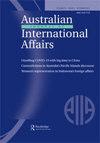民主、公司和网络惩罚:民主国家面临来自私营部门的哪些网络空间挑战?
IF 2.7
3区 社会学
Q2 INTERNATIONAL RELATIONS
引用次数: 0
摘要
摘要我对民主国家难以惩罚黑客数字行为的原因进行了四套解释。我的分析显示,在这四个挑战中,有两个比其他更令人信服。首先,学术研究表明,民主国家寻求满足人们的期望,遵守国际交战规则,避免在网络空间采取咄咄逼人的行为。其次,一些人认为,民主国家面临着来自担心局势升级的选民的强大挑战。我的调查显示,这些挑战没有下面两个那么严峻。首先,民主国家与私人行为者代表他们参与的特定互动所产生的复杂性作斗争。其次,民主国家面临着来自企业的压力,这些企业不愿参与导致法律和财务后果的活动。当国家预期与敌对行动有牵连的受害者和公司提起诉讼时,也可能会犹豫不决。总而言之,民主国家在惩罚策略上的挣扎,与其说是因为行为道德或升级恐惧,不如说是因为科技公司参与敌对行动的后果。关键词:网络安全民主国家惩罚私营部门披露声明作者未报告潜在的利益冲突。作者简介:本文作者是圣路易斯大学政治学副教授、国际研究中心主任。他在宾夕法尼亚大学获得政治学博士学位。在加入圣路易斯大学之前,他是麦克斯韦空军基地空军战争学院国际安全研究副教授。他的研究兴趣包括网络安全、国际安全和东亚安全问题。本文章由计算机程序翻译,如有差异,请以英文原文为准。
Democracy, firms, and cyber punishment: what cyberspace challenge do democracies face from the private sector?
ABSTRACTI explore four sets of explanations on what makes it hard for democracies to penalise hackers for their digital actions. My analysis reveals that of the four challenges, two are more compelling than the others. First, scholarship suggests that democracies seek to meet the expectation to comply with international rules of engagement and refrain from aggressive cyberspace behaviour. Second, some argue that democracies face strong challenge from constituents who fear escalation. My investigation shows that these challenges are less severe than the following two. First, democracies struggle with complications that arise out of particular interactions that private actors engage on their behalf. Second, democracies face pressure from firms that hesitate to be part of activities that cause legal and financial consequences. States may also hesitate when they anticipate lawsuits by victims and firms implicated in hostile actions. In sum, democracies struggle with punishment strategy not so much because of behavioural ethics or escalation fear as consequences of having technology firms involved in hostile operations.KEYWORDS: Cybersecuritydemocratic statespunishmentprivate sector Disclosure statementNo potential conflict of interest was reported by the author(s).Additional informationNotes on contributorsNori KatagiriNori Katagiri is associate professor of political science and director of international studies at Saint Louis University. His Ph.D. is in political science from the University of Pennsylvania. Prior to joining Saint Louis University, he was associate professor of international security studies at Air War College, Maxwell AFB. His research interests include security issues in cybersecurity, international security, and East Asia.
求助全文
通过发布文献求助,成功后即可免费获取论文全文。
去求助
来源期刊

Australian Journal of International Affairs
INTERNATIONAL RELATIONS-
CiteScore
3.20
自引率
13.30%
发文量
44
期刊介绍:
AJIA is the journal of the Australian Institute of International Affairs. The Institute was established in 1933 as an independent and non-political body and its purpose is to stimulate interest in and understanding of international affairs among its members and the general public. The aim of the Australian Journal of International Affairs is to publish high quality scholarly research on international political, social, economic and legal issues, especially (but not exclusively) within the Asia-Pacific region. The journal publishes research articles, refereed review essays and commentary and provocation pieces. ''Articles'' are traditional scholarly articles. ‘Review essays’ use newly published books as the basis to thematically examine current events in International Relations. The journal also publishes commentaries and provocations which are high quality and engaging pieces of commentary, opinion and provocation in a variety of styles. The Australian Journal of International Affairs aims to analyse international issues for an Australian readership and to present Australian perspectives to readers in other countries. While seeking to stimulate interest in and understanding of international affairs, the journal does not seek to promote any particular policies or approaches. All suitable manuscripts submitted are sent to two referees in a full ''double blind'' refereeing process.
 求助内容:
求助内容: 应助结果提醒方式:
应助结果提醒方式:


